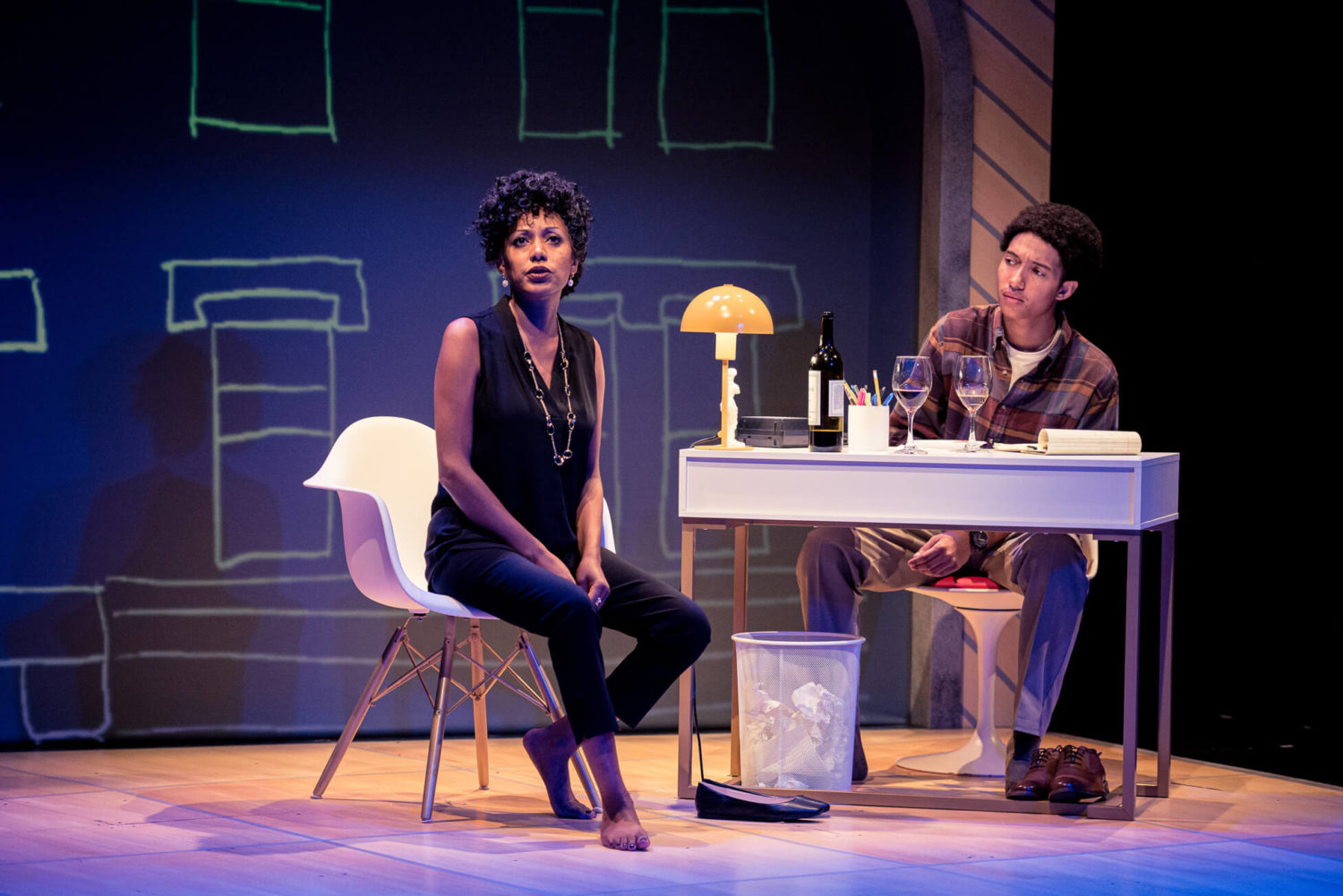
“I’ve learned that people will forget what you said, people will forget what you did, but people will never forget how you made them feel.”
The 2008 stage play “Mom, How Did You Meet the Beatles?”, written by Adrienne and Adam Kennedy, tells the true story of American playwright Adrienne Kennedy and her move to London, 5-year old son in tow, to write a play based on John Lennon’s books, “In His Own Write” and “A Spaniard in the Works.”
Forward Theater Company is presenting the play in the Playhouse at Overture Center in downtown Madison until September 26.
“I think we had about four hundred dollars, maybe five, but no more,” Kennedy recalls in the play. “I just wanted to change my life.”
And change her life she did. Suddenly, Kennedy (portrayhed by Marti Gobel) is thrust into the spotlight, finding herself in rooms and meetings with some of the most famous people in the world: Paul McCartney, John Lennon, and Laurence Olivier (of whom she is a very big fan). With each interaction, a bright yellow light shines from above and Gobel seems to be entranced, the brightness in her voice comparable to the light she bathes in.
The nature of her relationship with these various stars lacks pomp or conceit; She acts in complete awe, endearing the audience to her who too would become a blubbering mess if they encountered someone as famous as John Lennon.
The story, told almost entirely in monologue form featuring occasional probings from Kennedy’s son, Adam (portrayed by Jamaica Gobel), plays out as a series of anecdotes. It is not firmly linear and does not follow a strict narrative style. It is not tidy or structured. Rather, Kennedy presents her story just how most would tell a story from their past: with pauses, repetition, and hazy recollections, the retelling tinted by emotion, retroactively coloring and re-coloring the memories.
“Mom, How Did You Meet the Beatles?” is a sea of emotions in which key plot points and notions of formal storytelling simply exist as ships riding the waves, ceding to their ebb and flow. And here is where Gobel never falters. For the full length of the show, it seemed impossible to pull attention away for fear of missing just the slightest expression or movement. She was telling a story, quite captivatingly so that a second’s look away would mean missing such elegantly performed mastery of text and storytelling.
At first glance, it appeared as though Adam was of little importance other than occasionally getting up to polish his mother’s wine glass. Adam’s role seemed secondary, only existing to act the prompt for his mother. However, this is not the case; Adam turns out to be essential. His presence as Adrienne’s son provides an inherent intimacy which the audience is invited to relish in. Adam is hearing this for the first time, just as we are; Without him, the distance between the audience and actor would be far greater than that from the edge of the stage to the first row and beyond. This, in tandem with the play’s overall retreat from strict, linear storytelling, evokes an intimacy shared between the audience and the actors. Kennedy is not talking at the audience, but rather to the audience, a significant difference that allows us to exist as truly intent listeners in communion with Adam.
Underscoring the whole show is a deeply saddening look into the way in which institutions seek and utilize Black contribution but only after the Black individual has been stripped of all their access to profit or recognition and has been quietly dismissed. This becomes more evident as the play concludes with a recantation of the ways in which Kennedy was unceremoniously written off of her own play. Although Kennedy does not dig too deep into these prejudices, it would be false to say they were not present in both the true story and in the themes surrounding the play itself.
It is no secret that Kennedy is Black, in fact, she herself remarks on her own race, referring to the Beatles’ love of Chuck Berry and other Black American jazz and rock musicians. And is no secret that Kennedy’s exploitation is one that connects to both her gender and race (intersectionally). That despite her accolades, despite the appreciation and warmth she received from these famous idols, despite, despite, despite, Kennedy was an exception to the way Black women had been treated.
The sparse set is augmented by a screen in the background, displaying minimally drawn settings and the occasional crudely drawn portrait. These images were somewhat distracting and redundant. But there were moments of amusement found in the actors in tandem with the displays.

The lighting design, however, was superb, highlighting changes in emotion rather than scenes, perfectly accenting Gobel’s performance.
Nonetheless, the “Mom, How Did You Meet the Beatles?” is one of those shows where you get to practice actively listening, at no expense to yourself because it would be impossible to not want to; The power of Kennedy’s words in tandem with both Gobels’ performances ensure that your experience is not only enjoyable but a truly captivating experience that will fill the soul not because it is especially fulfilling or has some profound moral, but because it is real and true and performed as such.



